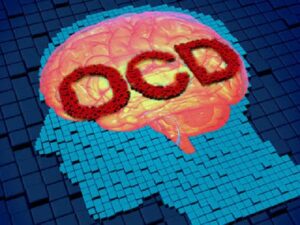Living with OCD can be difficult, especially when you don’t have access to treatment. However, there are many things that you can do at home to help manage your symptoms. In this blog post, we will discuss 15 tips for OCD at-home treatment. These tips include both behavioral and cognitive techniques that are effective in reducing OCD symptoms. If you are struggling with OCD, please give these tips a try!
Contents
- 1 What Is OCD?
- 2 Tips For OCD at-Home Treatment
- 2.1 Create Structure
- 2.2 Challenge Your Thoughts
- 2.3 Eat Healthily & Exercise Regularly
- 2.4 Reach Out for Support
- 2.5 Practice Mindfulness
- 2.6 Set Realistic Goals
- 2.7 Record Your Progress
- 2.8 Get Enough Sleep
- 2.9 Engage in Relaxation Techniques
- 2.10 Take Time Out For Yourself
- 2.11 Use Positive Self-Talk
- 2.12 Be Kind To Yourself
- 2.13 Stay Patient
- 2.14 Try Cognitive Behavior Therapy
- 3 Are There Any Limitations of OCD at-Home Treatment?
- 4 Conclusion
What Is OCD?

OCD is an anxiety disorder that causes someone to have recurring and distressing thoughts, images, or impulses. The person affected by OCD may feel compelled to take certain actions in an attempt to reduce the distress they are feeling.
The signs of OCD can be complex and varied, making it difficult to diagnose. Common symptoms may include:
- Obsession with cleanliness and orderliness
- Excessive worry about the safety of others or oneself
- Intrusive thoughts or images that one cannot control
- Engaging in repetitive behaviors such as checking or counting
- Feeling an excessive need for symmetry and organization
The most effective treatment for OCD is Cognitive Behavioral Therapy (CBT). CBT teaches the person to recognize and challenge their thoughts, emotions, and behavior patterns related to OCD. Medication may also be prescribed in combination with CBT.
Tips For OCD at-Home Treatment
The good news is that OCD doesn’t have to take over your life. Several at-home treatments for OCD can help you manage your symptoms and live a more fulfilling life. Here are 15 tips to get you started:
Create Structure
Creating structure in your daily life will help give you the sense of control you need to manage your obsessive-compulsive disorder (OCD). Establishing predictable routines and rituals can provide comfort and security, allowing you to stay on track with your treatment plan while still having fun and enjoying yourself. When creating your daily structure, be sure to include activities that you enjoy.
Challenge Your Thoughts

Obsessive thoughts can be overwhelming and difficult to manage. It is important to remember that these thoughts are not always true. Challenge your negative thoughts by questioning their accuracy and identifying alternative ways of thinking about them. Writing down your intrusive thoughts and challenging them on paper can help make the process easier.
Eat Healthily & Exercise Regularly
Maintaining a healthy diet and exercising regularly will help keep your body energized and balanced physically, which in turn can help reduce stress levels related to OCD. Eating healthy foods such as fruits, vegetables, lean proteins, whole grains, and healthy fats will provide energy for the day ahead while exercising can help relieve built-up anxiety.
Reach Out for Support
It is important to remember that you are not alone in your struggle with OCD. Talking to a friend or family member about what is going on can be very helpful in managing symptoms and staying motivated in your treatment plan. If you don’t feel comfortable talking to someone close to you, seek out a therapist or support group where you can get the emotional support and guidance you need.
Practice Mindfulness

Mindfulness involves paying attention to the present moment without judgment or reaction. Practicing mindfulness techniques such as meditation, deep breathing, and yoga can help reduce stress and intrusive thoughts related to OCD while improving concentration and focus. Set aside time each day to practice mindfulness and notice how your body responds.
Set Realistic Goals
It is important to set realistic goals when it comes to managing OCD. Break down big tasks into smaller, more manageable steps, and don’t be afraid to ask for help if you need it. Reward yourself when you reach your goals, no matter how small they are, as this will help motivate you to keep going.
Record Your Progress
Keeping a record of your progress can be very helpful in managing symptoms of OCD. Writing down your thoughts and feelings each day can help identify triggers that may influence the intensity of your obsessive-compulsive disorder symptoms. This information can then be used to develop strategies for overcoming these triggers and minimizing their effects on your daily life.
Get Enough Sleep
Getting enough sleep is essential for managing OCD symptoms. Not getting enough rest can increase anxiety levels, while too much sleep can lead to fatigue and inactivity. Aim for 7-9 hours of quality sleep each night to maintain a healthy balance between activity and rest. This also allows your body to relax and recharge.
Engage in Relaxation Techniques
Relaxation techniques such as progressive muscle relaxation, guided imagery, and autogenic training can help reduce stress levels associated with OCD. Taking time each day to practice these techniques will give your mind a break from obsessive thoughts while helping you feel more relaxed and in control.
Take Time Out For Yourself

It is important to take time out for yourself, even if it is just 5 minutes a day. Do something that brings you joy, such as taking a walk in nature or simply listening to music. This will help reduce stress levels and provide an opportunity for reflection and mindfulness practice. This can also help reduce the effects of intrusive thoughts and provide a sense of peace.
Use Positive Self-Talk
Positively talking to yourself can be helpful when dealing with OCD symptoms. Reminding yourself that you are capable and strong enough to manage your OCD will give you the motivation and confidence needed to take on difficult tasks. Reframe negative thoughts into more positive ones, and focus on all the things you have achieved so far in your recovery journey.
Be Kind To Yourself
It is normal for people with OCD to be overly critical of themselves when dealing with anxiety and intrusive thoughts. Be kind to yourself, even when it feels difficult. Replace self-criticism with compassion and understanding, and focus on the things you are doing to help manage your symptoms.
Stay Patient
Recovering from OCD can be a long process, but it is important to stay patient and remind yourself that progress is being made, however small. It may take some time before changes become visible, so don’t give up hope if you don’t see immediate results. Remember that you have the power to make positive changes in your life and take control of your OCD symptoms.
Try Cognitive Behavior Therapy
Cognitive behavior therapy (CBT) is a type of psychotherapy that can help people manage their OCD symptoms. CBT focuses on changing unhelpful thoughts and behaviors, while also teaching coping strategies and relaxation techniques. Consider talking to a mental health professional about Cognitive Behavioral Therapy if you feel like you need additional support in managing your symptoms.
By following these 10 tips, you can significantly reduce the intensity of your OCD symptoms and work towards a more balanced and fulfilling life. With support, compassion, and dedication, recovery is possible. Today create an effective treatment plan for managing your OCD symptoms.
Are There Any Limitations of OCD at-Home Treatment?
The limitations of OCD at-home treatment include difficulties with motivation, lack of feedback, and difficulty staying consistent with the prescribed techniques. It can be difficult to stay motivated when you’re doing your treatment. This is instead of having a professional to guide and encourage you along.
Additionally, since there is no direct contact between a therapist and a patient during at-home treatment. It can be hard to get feedback on how your progress is going. Finally, it can be hard to stick to the treatment strategies without regular reminders from a professional, and a lack of accountability if you don’t do them regularly.
However, despite these potential limitations, OCD at-home treatment still has many benefits such as convenience (no need to travel for therapy sessions), cost savings (no need to pay for therapy sessions), and being able to do it on your terms.
Conclusion
OCD at-home treatment can be an effective way to manage your symptoms and improve your quality of life. By being mindful of the triggers that set off OCD episodes, you can practice techniques for managing them and develop healthier coping patterns. Additionally, techniques such as relaxation exercises, journaling, and self-affirmations can help keep symptoms under control.
For more information and guidance, please contact OCDMantra. OCD is a mental health disorder characterized by obsessions and compulsions. If you have any queries regarding OCD treatment, ERP therapy experienced therapists at OCDMantra can help: Book a trial OD therapy session.


